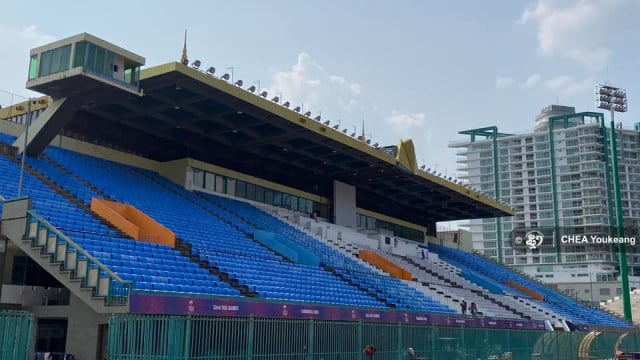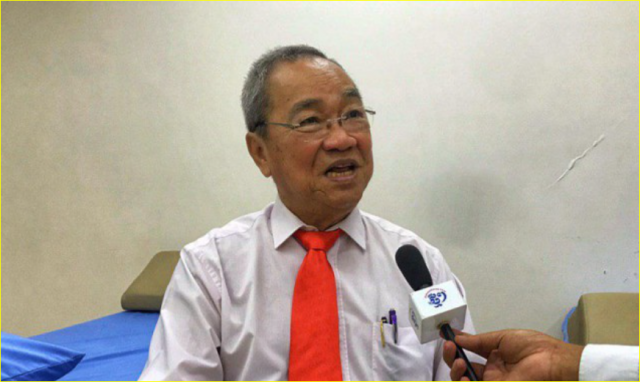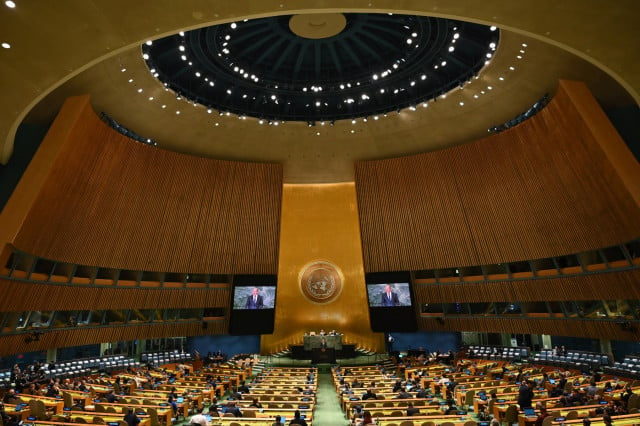Putin Opponent Offers Hope to Thousands, Although Few Expect Him to Win Russian Election

- By Associated Press (AP)
- January 26, 2024 4:10 PM
They have lined up by the thousands across Russia in recent days, standing in the bitter cold for a chance to sign petitions to support an unlikely challenger to President Vladimir Putin.
Boris Nadezhdin has become a dilemma for the Kremlin as he seeks to run in the March 17 presidential election. The question now is whether Russian authorities will allow him on the ballot.
The stocky, bespectacled 60-year-old local legislator and academic has struck a chord with the public, openly calling for a halt to the conflict in Ukraine, the end of mobilizing Russian men for the military, and starting a dialogue with the West. He also has criticized the country’s repression of LGBTQ+ activism.
“The collection of signatures has gone unexpectedly well for us,” Nadezhdin told The Associated Press in an interview Wednesday in Moscow. “We didn’t expect this, to be honest.”
Nadezhdin’s name is a form of the Russian word for “hope,” and although he is highly unlikely to defeat the still-popular Putin, the lines are a rare sign of protest, defiance and optimism in a country that has seen a harsh crackdown on dissent since its troops rolled into Ukraine nearly two years ago.
Nadezhdin is running as a candidate for the Civic Initiative Party. Because the party is not represented in parliament, he's not guaranteed a spot on the ballot and must collect over 100,000 signatures, with a limit of 2,500 from each of the dozens of the vast country's regions, not just the biggest, more progressive cities.
Putin, who is running as an independent candidate rather than as the candidate of the United Russia ruling party, has collected over 3 million.
Waiting to sign a petition in St. Petersburg, Alexander Rakityansky told AP he went through a “period of apathy when I thought I couldn’t do anything.” Now, however, he sees Nadezhdin’s campaign as a chance to exercise his civil rights.
Originally from Belgorod, the Russian border city hit by repeated Ukrainian attacks, Rakityansky said he backed Nadezhdin so his hometown “doesn’t get bombed and people don’t die on the streets.”
Online videos have shown queues of supporters not just in Moscow and St. Petersburg but also in Krasnodar in the south, Saratov and Voronezh in the southwest and beyond the Ural Mountains in Yekaterinburg.
Even in the Far East city of Yakutsk, 450 kilometers (280 miles) south of the Arctic Circle, Nadezhdin's team said up to 400 people a day braved temperatures that plunged to minus 40 Celsius (minus 40 Fahrenheit) to sign petitions.
“Our weather conditions are not perfect and it’s generally accepted that it’s difficult to involve people in the north in some kind of activity, but people are coming every day,” said Alexei Popov, the head of Nadezhdin’s election team in Yakutsk. He said they had initially expected about 500 signatures in total for the entire region.
At a petition collection site in Moscow, Kirill Savenkov, 48, said he supported Nadezhdin because of his stand on Ukraine and peace negotiations.
Others said they wanted a real alternative to Putin, who they suggested had led the country into a dead end.
“The economy is really falling, people are getting poorer and prices are rising,” said Anna, 21, of St. Petersburg, who refused to give her full name because she feared for her security. Putin, she said, has not done “anything good for the country.”
Nadezhdin's campaign got a boost after opposition leaders abroad, including former tycoon Mikhail Khodorkovsky and supporters of imprisoned opposition politician Alexei Navalny, urged Russians to support any candidate who could deny Putin a share of the vote.
Exiled opposition activist Maxim Katz said on YouTube that whatever the outcome, Nadezhdin's candidacy shows “there is one thing we know right now: Conversations about civic apathy in Russia are very far from reality. What we have is not civic apathy but a civic famine — an enormous hidden potential.”
Some analysts say the surge of support for Nadezhdin has surprised even the Kremlin, although Putin spokesman Dmitry Peskov said Thursday that “we don’t see him as a rival.”
Analysts say the election's outcome is a foregone conclusion and that Putin will stay in power for another six years, but some also suggest it's still a moment of genuine political risk for the Kremlin, which must project an aura of legitimacy for the balloting to be seen as a genuine contest.
For Putin to win a convincing victory, he needs his supporters to turn out and his critics must stay home with no “glimmer of hope,” said Ekatarina Schulmann, a political scientist and nonresident scholar at the Carnegie Russia Eurasia Center in Berlin.
“This is why Nadezhdin is such a problem," she said in an interview. "He provides a shadow of hope.”
Nadezhdin's supporters lining up in Moscow and St. Petersburg told AP it gave them the rare opportunity to be with like-minded people who want a different leader from Putin, 71, who has ruled Russia for 24 years.
“I understood that these are the people who want to change the current government and I want to be a part of this,” said Margarita, a 28-year-old student who also declined to give her surname for fear of retribution.
So far, Russia's Central Election Commission has approved three candidates who were nominated by parties represented in parliament that largely support Kremlin policies: Nikolai Kharitonov of the Communist Party, Leonid Slutsky of the nationalist Liberal Democratic Party and Vladislav Davankov of the New People Party. Kharitonov ran against Putin in 2004, finishing a distant second.
In December, authorities barred from the ballot Yekatarina Duntsova, a former regional lawmaker who had called for peace in Ukraine. The commission cited technical errors in her paperwork.
Duntsova was probably barred because authorities “don’t know her, and so in their terms she is unpredictable. And above all they dislike unpredictable things,” Schulmann said.
Although there have been claims that Nadezhdin secretly has the Kremlin’s approval to run and is seen as kind of a spoiler candidate, he still could be ruled ineligible.
He has appeared as a pundit on Russian television and even criticized the conflict in Ukraine during a talk show on state-controlled NTV in September 2022 — a rare level of visibility not enjoyed by other opposition politicians such as Navalny and Vladimir Kara-Murza, both now imprisoned.
In that appearance, Nadezhdin said Putin was misled by intelligence services that apparently told him Ukrainian resistance would be brief and ineffective.
In his AP interview, Nadezhdin said he believes he has been allowed to run because he is a known entity and has not specifically criticized Putin.
“I personally know Putin,” he said, saying he met him before he became president in 2000, adding that in the 1990s, he was an assistant to then-Prime Minister Sergey Kiriyenko, now Putin's first deputy chief of staff.
Schulmann said that while authorities could allow Nadezhdin to run, it's a “dangerous gamble.”
“I think they will cut him off at the next stage when he brings those signatures,” she said, suggesting the Central Election Commission could declare some of them invalid and bar him from the ballot. She suggested authorities could also threaten him and his team with prison if he later urged his supporters to protest.
The election is the first since Putin annexed four Ukrainian regions and the first in which online voting will be used nationwide. Critics suggest that both are opportunities to rig results in favor of Putin — something the Kremlin has denied it will do.
No matter what the actual outcome, some analysts and political opponents suggest that the sight of those lining up in the cold for Nadezhdin reveals more about Russia today than the vote itself.
Although Nadezhdin indicated he believes Putin's team did not initially perceive him as a risk, he said “the Kremlin administrators are now in a difficult position.”
If he were in their shoes, he said, “I would now be thinking, ‘Why did we let him do this?’”















